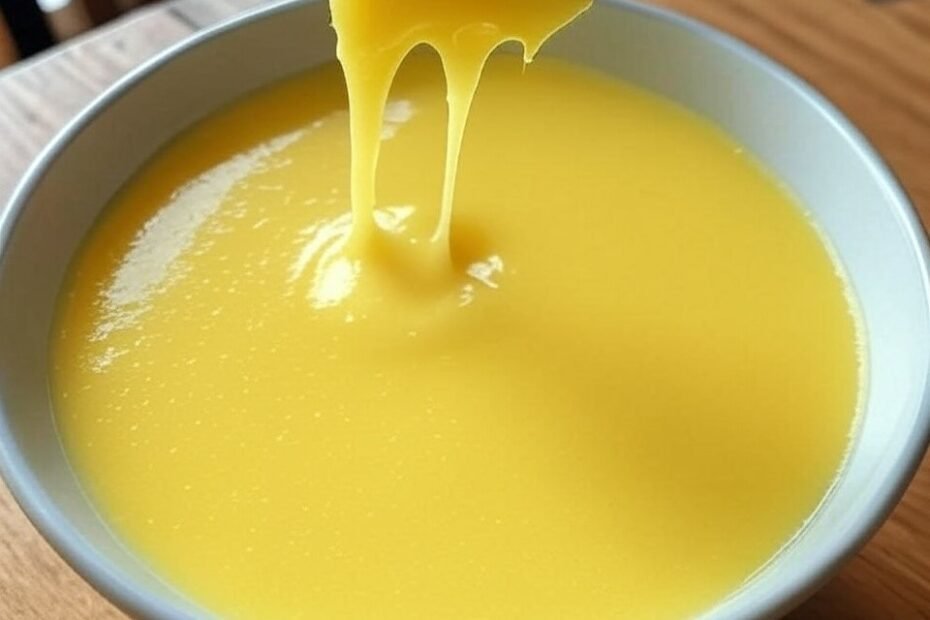If you ever travel to the Black Sea region of Türkiye, you will hear locals speak fondly of a dish that warms both the stomach and the soul — Muhlama (also called Kuymak in some villages). It is a creamy, golden mixture of cornmeal, butter, cheese, and sometimes garlic. When you scoop it with fresh bread, the melted cheese stretches in long strings — ah, çocuklar (children), that’s the joy of a true Karadeniz (Black Sea) breakfast.
In my grandmother’s house in Trabzon, Muhlama was not just food; it was tradition. Each morning, the sound of sizzling butter and the smell of melting cheese would spread through the home. Served with hot bread, olives, honey, and steaming glasses of çay (tea), it was a breakfast that kept us strong through long days.
What is Muhlama?
Muhlama is often compared to fondue or polenta, but it is simpler and richer. The base is cornmeal cooked with butter, then mixed with a generous amount of local cheese — usually a stretchy type like Trabzon cheese or Kolot peyniri. When stirred properly, the dish becomes smooth, creamy, and perfectly stretchy.
It is traditionally enjoyed in the morning, but in many homes, it can also be a light lunch or dinner. Some families add a little garlic for flavor, while others keep it pure and simple.
Step-by-Step Muhlama Recipe
Ingredients (for 3–4 people):
- 3 tablespoons butter (preferably village butter for deep flavor)
- 1 tablespoon olive oil (optional, to prevent burning)
- 1 cup cornmeal (fine or medium ground, not too coarse)
- 2 ½ cups water (or milk for a creamier taste)
- 1 ½ cups melting cheese (Trabzon cheese, Kolot, or a mix of mozzarella and mild cheddar if abroad)
- 2 cloves garlic, finely grated (optional, for a fragrant touch)
- Salt, to taste
Method:
- Melt the butter – In a shallow pan, heat butter over medium flame until it begins to sizzle. Add olive oil if you want to keep it from burning.
- Cook the cornmeal – Sprinkle in the cornmeal slowly while stirring. Cook for 2–3 minutes until it absorbs the butter and gives a nutty smell.
- Add liquid – Pour in water (or milk). Stir continuously to avoid lumps. Let it simmer until the mixture thickens and starts to pull away from the sides of the pan.
- Season with garlic – If using garlic, add it now and stir gently.
- Add the cheese – Lower the flame. Add the grated cheese little by little, stirring until it melts completely into the cornmeal mixture. The texture should be creamy, smooth, and stretchy.
- Serve hot – Bring the pan directly to the table. Tear off pieces of fresh bread and dip straight into the Muhlama. Don’t wait too long — it is best eaten hot, while the cheese still stretches!
Grandma’s Little Secrets
- The choice of cheese matters. Stretchy cheese gives that beautiful, stringy texture that Muhlama is famous for.
- Use a wide, shallow pan — it cooks more evenly and looks beautiful on the breakfast table.
- Never rush the cooking. Stir gently and allow the cheese to melt slowly. Sabır (patience) makes the dish perfect.
Cooking Time & Nutrition
- Preparation Time: 5 minutes
- Cooking Time: 15 minutes
- Total Time: 20 minutes
Nutrition (per serving, approx. for 4 servings):
- Calories: ~320 kcal
- Protein: 12 g
- Fat: 22 g
- Carbohydrates: 20 g
- Fiber: 2 g
Muhlama is not a “light” dish, but it is deeply nourishing. With its balance of cornmeal, butter, and cheese, it gives energy and warmth — no wonder it is beloved in the cool, misty Black Sea mountains.
Closing Thoughts
Eating Muhlama is more than just enjoying food; it is sharing culture, memory, and family. When the cheese stretches from the pan to your bread, you are not just tasting butter and cornmeal — you are tasting the spirit of Karadeniz, the hospitality of Turkish kitchens, and the warmth of tradition passed down through generations.
So next time you want to surprise your loved ones, make Muhlama. Serve it with hot bread, olives, and endless glasses of çay.
Afiyet olsun! (May it be good for you!)
